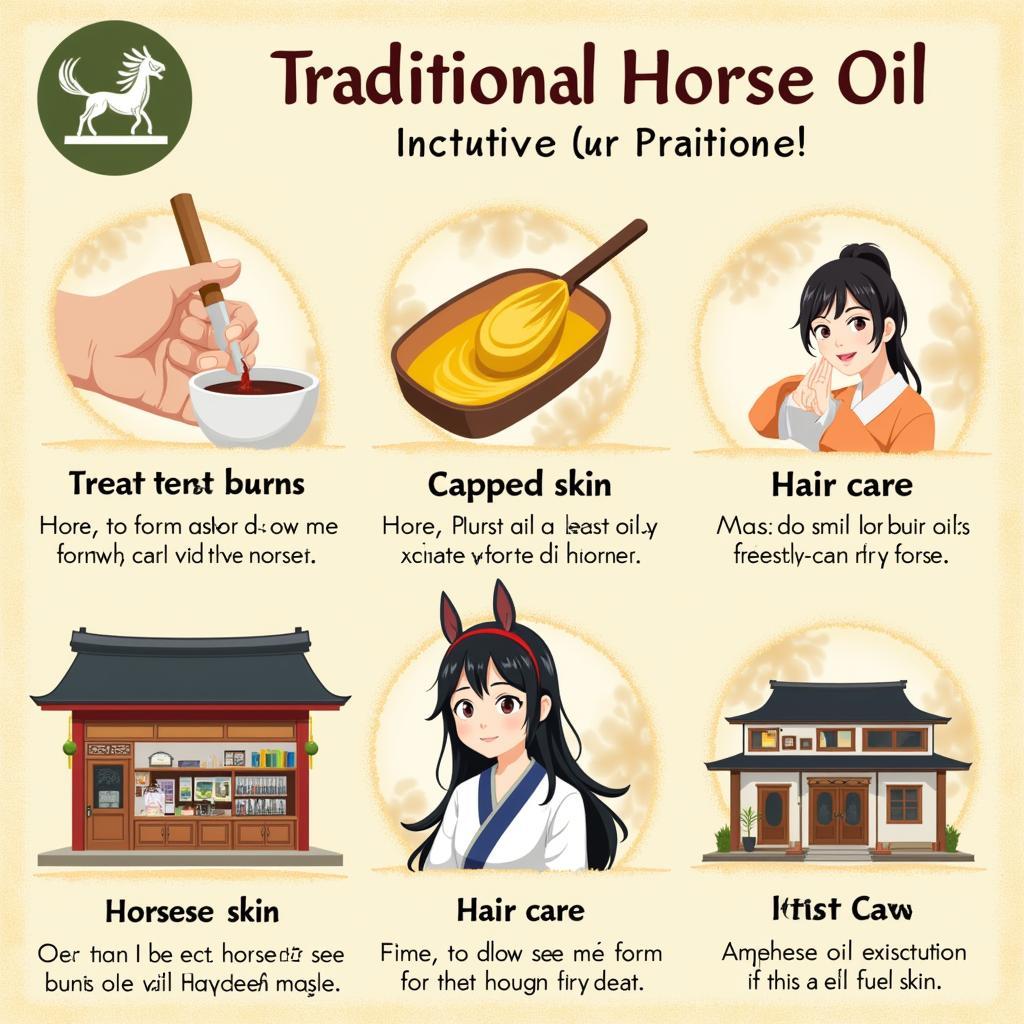Horse oil, also known as “sonbayu” in Japan, has a long and rich history. From its traditional use in Japan to its modern applications, horse oil has captivated people for its purported benefits. Let’s delve into the fascinating world of horse oil, exploring its origins, uses, and the science behind its popularity.  Traditional Uses of Horse Oil in Japan
Traditional Uses of Horse Oil in Japan
The History of Horse Oil in Japan
For centuries, horse oil has been a staple in Japanese households, prized for its moisturizing and healing properties. It was traditionally used to treat burns, wounds, dry skin, and even hair loss. Samurai warriors are said to have used it to protect their skin from the elements and to promote healing after battle. This reliance on horse oil cemented its place in Japanese culture.
The use of horse oil in Japan can be traced back to the Edo period (1603-1868). During this time, it was a common remedy for various skin ailments. adaay in asia horse It was also used as a lubricant for tools and machinery. The practice of using horse oil continues to this day, though its applications have evolved.
The Science Behind Horse Oil Benefits
Horse oil is rich in essential fatty acids, including linoleic acid, alpha-linolenic acid, and oleic acid. These fatty acids are vital for maintaining healthy skin and promoting cell regeneration. They also have anti-inflammatory properties, which can be beneficial for treating skin conditions like eczema and psoriasis. What makes horse oil particularly effective is its similarity to human sebum, allowing for easy absorption and deep moisturization.
Furthermore, horse oil contains ceramides, which play a crucial role in maintaining the skin’s barrier function. This barrier is essential for protecting the skin from environmental damage and preventing moisture loss. By replenishing ceramides, horse oil helps strengthen this barrier, resulting in healthier, more hydrated skin.
Modern Applications of Horse Oil
While still used for its traditional purposes, horse oil has found its way into various modern applications. It’s a popular ingredient in skincare products, including lotions, creams, and soaps. Its moisturizing properties make it ideal for dry, sensitive skin, and its anti-inflammatory benefits can help soothe irritated skin.
van gogh horse Horse oil is also gaining popularity as a hair care ingredient. It can help improve hair shine, reduce frizz, and even promote hair growth. Many people use it as a leave-in conditioner or add a few drops to their shampoo or conditioner.
Is Horse Oil Ethical?
The ethical sourcing of horse oil is a valid concern. Consumers should seek out brands that prioritize ethical and sustainable practices, ensuring that the horses are treated humanely. Look for certifications and transparency from manufacturers.  Ethical Sourcing and Production of Horse Oil
Ethical Sourcing and Production of Horse Oil
Where to Buy Horse Oil
Finding genuine, high-quality horse oil is important. Look for reputable brands that source their oil ethically. You can find horse oil products online, in specialty stores, and even in some pharmacies. cherry blossom horse Be sure to read reviews and compare products before making a purchase.
Horse Oil for Hair: A Deep Dive
horse oil for hair The use of horse oil for hair has been a tradition in Japan for generations. Its ability to penetrate the hair shaft deeply makes it a powerful moisturizing agent, leaving hair soft, shiny, and manageable.
Can Horses Eat Millet?
While we are discussing horses, let’s address a common question: can horses eat millet? Millet can be a part of a horse’s diet, providing beneficial nutrients. However, like any feed, it should be introduced gradually and in moderation.
Conclusion
Horse oil from Japan has a fascinating history and a wide range of potential benefits. From skincare to hair care, its unique properties make it a valuable ingredient worth exploring. Remember to choose ethically sourced products and consult with a dermatologist or other healthcare professional before using horse oil to treat specific skin conditions.
FAQ
-
What is horse oil?
Horse oil, or sonbayu, is a rendered fat extracted from horses. -
What are the benefits of horse oil?
It’s known for its moisturizing and anti-inflammatory properties. -
Is horse oil safe for all skin types?
Generally, yes, but perform a patch test if you have sensitive skin. -
Where can I buy horse oil?
Online retailers, specialty stores, and some pharmacies carry horse oil products. -
How is horse oil used for hair care?
It can be used as a leave-in conditioner or added to existing hair products. -
Is horse oil cruelty-free?
Look for brands committed to ethical and sustainable sourcing. -
Is horse oil expensive?
Prices vary based on brand and product type.
Common Scenarios and Questions
- Dry skin in winter: Horse oil can be a great remedy for dry, chapped skin during harsh winter months.
- Treating minor burns: Traditionally, horse oil was used to soothe minor burns and promote healing.
- Improving hair shine: A few drops of horse oil can add shine and reduce frizz in dry or damaged hair.
Related Articles and Further Reading
For more information on horse care and related topics, explore our other articles on Justus Horses USA.
When you need support, please contact us: Phone: 0772127271, Email: [email protected] Or visit us at: QGM2+WX2, Vị Trung, Vị Thuỷ, Hậu Giang, Việt Nam. We have a 24/7 customer service team.